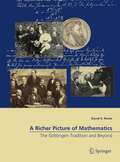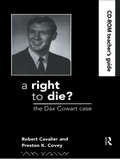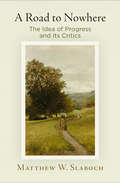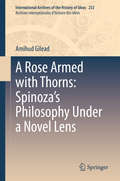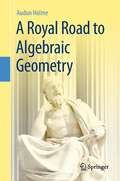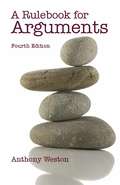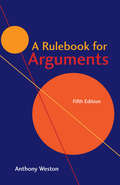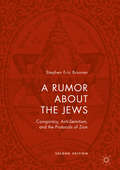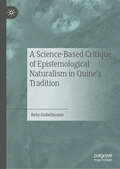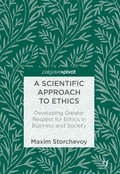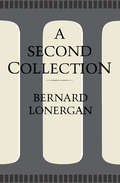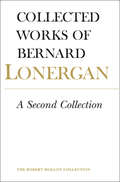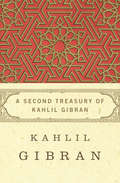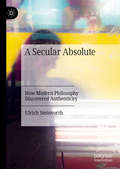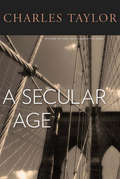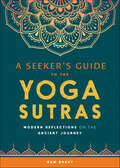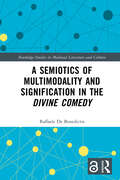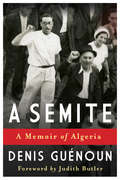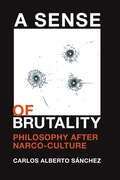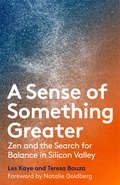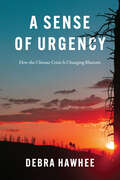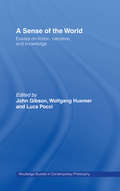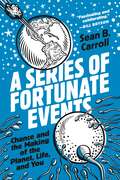- Table View
- List View
A Richer Picture of Mathematics: The Göttingen Tradition and Beyond
by David E. RoweHistorian David E. Rowe captures the rich tapestry of mathematical creativity in this collection of essays from the “Years Ago” column of The Mathematical Intelligencer. With topics ranging from ancient Greek mathematics to modern relativistic cosmology, this collection conveys the impetus and spirit of Rowe’s various and many-faceted contributions to the history of mathematics. Centered on the Göttingen mathematical tradition, these stories illuminate important facets of mathematical activity often overlooked in other accounts. Six sections place the essays in chronological and thematic order, beginning with new introductions that contextualize each section. The essays that follow recount episodes relating to the section’s overall theme. All of the essays in this collection, with the exception of two, appeared over the course of more than 30 years in The Mathematical Intelligencer. Based largely on archival and primary sources, these vignettes offer unusual insights into behind-the-scenes events. Taken together, they aim to show how Göttingen managed to attract an extraordinary array of talented individuals, several of whom contributed to the development of a new mathematical culture during the first decades of the twentieth century.
A Right to Die?: Teachers Guide
by David Andersen Robert Cavalier Preston CoveyA 96 page guide to the background, program, uses for and contact time needed with the CD-ROM A Right to Die? The Dax Cowart Case. This guide is supplied free with every multi-user copy of the CD-ROM, and will prove invaluable for all those planning to use the program in a classroom setting. This guide is not available to purchase separately.
A Road to Nowhere: The Idea of Progress and Its Critics
by Matthew W. SlabochSince the Enlightenment, the idea of progress has spanned right- and left-wing politics, secular and spiritual philosophy, and most every school of art or culture. The belief that humans are capable of making lasting improvements—intellectual, scientific, material, moral, and cultural—continues to be a commonplace of our age. However, events of the preceding century, including but not limited to two world wars, conflicts in Korea and Vietnam, the spread of communism across Eastern Europe and parts of Asia, violent nationalism in the Balkans, and genocides in Cambodia and Rwanda, have called into question this faith in the continued advancement of humankind.In A Road to Nowhere, Matthew W. Slaboch argues that political theorists should entertain the possibility that long-term, continued progress may be more fiction than reality. He examines the work of German philosophers Arthur Schopenhauer and Oswald Spengler, Russian novelists Leo Tolstoy and Aleksandr Solzhenitsyn, and American historians Henry Adams and Christopher Lasch—rare skeptics of the idea of progress who have much to engage political theory, a field dominated by historical optimists. Looking at the figures of Schopenhauer, Tolstoy, and Adams, Slaboch considers the ways in which they defined progress and their reasons for doubting that their cultures, or the world, were progressing. He compares Germany, Russia, and the United States to illustrate how these nineteenth-century critics of the idea of progress contributed to or helped forestall the emergence of forms of government that came to be associated with each country: fascism, communism, and democratic capitalism, respectively.Turning to Spengler, Solzhenitsyn, and Lasch, Slaboch explores the contemporary relevance of the critique of progress and the arguments for and against political engagement in the face of uncertain improvement, one-way inevitable decline, or unending cycles of advancement and decay. A Road to Nowhere concludes that these notable naysayers were not mere defeatists and presents their varied prescriptions for individual and social action.
A Rose Armed with Thorns: Spinoza’s Philosophy Under a Novel Lens (International Archives of the History of Ideas Archives internationales d'histoire des idées #232)
by Amihud GileadThis book presents a systemic analysis of Spinoza’s philosophy and challenges the traditional views. It deals with Spinoza’s concepts of substance, truth conditions, attributes, and the first, second, and supreme grades of knowledge. Based upon an analysis of the relevant details in all of Spinoza’s philosophical works, the book reveals many important points, including the following: Spinoza’s system is not, nor is meant to be, a foundational-deductive system but was meant to be a coherent system of a network model. Spinoza’s reality is not made in the image of a mathematical model. Imaginatio, the first grade of knowledge, and ratio, the second grade, are parts or properties of the supreme grade of knowledge, scientia intuitiva, which is their essence. Finite beings, especially humans, are necessary and eternal (unless they are mistakenly perceived by imaginatio) whereas time, place, and death are simply “entities of imagination.” The salvation, happiness, and blessedness that Spinoza’s Ethics offers us, are active and depend only upon us. Concluding a careful examination and interpretation, the book suggests additional novel viewpoints in interpreting Spinoza’s philosophical psychology and political philosophy.
A Royal Road to Algebraic Geometry
by Audun HolmeThis book is about modern algebraic geometry. The title A Royal Road to Algebraic Geometry is inspired by the famous anecdote about the king asking Euclid if there really existed no simpler way for learning geometry, than to read all of his work Elements. Euclid is said to have answered: "There is no royal road to geometry!" The book starts by explaining this enigmatic answer, the aim of the book being to argue that indeed, in some sense there is a royal road to algebraic geometry. From a point of departure in algebraic curves, the exposition moves on to the present shape of the field, culminating with Alexander Grothendieck's theory of schemes. Contemporary homological tools are explained. The reader will follow a directed path leading up to the main elements of modern algebraic geometry. When the road is completed, the reader is empowered to start navigating in this immense field, and to open up the door to a wonderful field of research. The greatest scientific experience of a lifetime!
A Rulebook for Arguments
by Anthony WestonA Rulebook for Arguments is a succinct introduction to the art of writing and assessing arguments, organized around specific rules, each illustrated and explained soundly but briefly. This widely popular primer--translated into eight languages--remains the first choice in all disciplines for writers who seek straightforward guidance about how to assess arguments and how to cogently construct them.The fourth edition offers a revamped and more tightly focused approach to extended arguments, a new chapter on oral arguments, and updated examples and topics throughout.
A Rulebook for Arguments
by Anthony WestonFrom academic writing to personal and public discourse, the need for good arguments and better ways of arguing is greater than ever before. This timely fifth edition of A Rulebook for Arguments sharpens an already-classic text, adding updated examples and a new chapter on public debates that provides rules for the etiquette and ethics of sound public dialogue as well as clear and sound thinking in general.
A Rumor about the Jews: Reflections On Antisemitism And The Protocols Of The Learned Elders Of Zion
by Stephen Eric BronnerIn its portrayal of Judaism as a worldwide conspiracy dedicated to the destruction of Christian civilization, the Protocols of the Learned Elders of Zion remains one of the most infamous documents ever written. Despite being proven a crude forgery, the pamphlet managed to pervade twentieth-century thinking, often being twisted to suit its handlers' purposes, and to justify the most extreme persecution of the Jews. In A Rumor About the Jews, Stephen Eric Bronner provides a history of this notorious fabrication—one which has renewed salience in a “post truth” society dominated by “fake news"—and explores its influence on right-wing movements throughout the twentieth century and the ongoing appeal of bigotry. This new edition of Bronner's 2000 classic (described by Kirkus as "the best short book on anti-Semitism") expands the arguments of the first edition, bringing the work up to date in a new political context.
A Sceptical Guide to Meaning and Rules: Defending Kripke's Wittgenstein
by Martin KuschNo other recent book in Anglophone philosophy has attracted as much criticism and has found so few friends as Saul Kripke's "Wittgenstein on Rules and Private Language". Amongst its critics, one finds the very top of the philosophical profession. Yet, it is rightly counted amongst the books that students of philosophy, at least in the Anglo-American world, have to read at some point in their education. Enormously influential, it has given rise to debates that strike at the very heart of contemporary philosophy of mind and language. In this major new interpretation, Martin Kusch defends Kripke's account against the numerous weighty objections that have been put forward over the past twenty years and argues that none of them is decisive. He shows that many critiques are based on misunderstandings of Kripke's reasoning; that many attacks can be blocked by refining and developing Kripke's position; and that many alternative proposals turn out either to be unworkable or to be disguised variants of the view they are meant to replace. Kusch argues that the apparent simplicity of Kripke's text is deceptive and that a fresh reading gives Kripke's overall argument a new strength.
A Science-Based Critique of Epistemological Naturalism in Quine’s Tradition
by Reto GubelmannAt the intersection of epistemology, metaphilosophy, and philosophy of science, this exciting new book examines the epistemic limits of empirical science. It makes a unique contribution to research on epistemological naturalism in Quine’s tradition by criticizing the position based on first-order data from empirical psychology and the history of natural science. This way, it meets the naturalist on their own ground not only regarding subject matter, but also regarding their epistemic methods. The book explores the works of a variety of philosophers in the field, including W. V. Quine, Penelope Maddy, Tyler Burge, Stathis Psillos and Howard Sankey. By carefully considering experimental results from behaviourism as well as developmental and perceptual psychology, Gubelmann finds that none of these disciplines can furnish the epistemic means to successfully naturalize the central cognitive preconditions of scientific theorizing. Furthermore, Gubelmann presents novel arguments for the claims that epistemological naturalists are committed to scientific realism, and that they are unable to defend this position. Based on these results, Gubelmann concludes that epistemology is not part of empirical science, which directly contradicts epistemological naturalism.
A Scientific Approach to Ethics: Developing Greater Respect for Ethics in Business and Society
by Maxim StorchevoyThis book suggests that normative ethics should be developed as a social science, and that this will improve its reputation in business and society. Storchevoy defines four criteria of a good scientific method (clear definitions, correct logic, empirical verification, accurate measurement) and demonstrates how normative ethics can make use of them. He provides a historical review of the methodological evolution of normative ethics and outlines how it was moving in a nonlinear way towards this scientific development by the 16th century. A Scientific Approach to Ethics challenges the reputation of ethics among many within business and business schools as unscientific and argues that it can come to be seen as a scientific discipline able to reveal universal moral truth.
A Search for Sovereignty
by Lauren BentonA Search for Sovereignty approaches world history by examining the relation of law and geography in European empires between 1400 and 1900. Lauren Benton argues that Europeans imagined imperial space as networks of corridors and enclaves, and that they constructed sovereignty in ways that merged ideas about geography and law. Conflicts over treason, piracy, convict transportation, martial law, and crime created irregular spaces of law, while also attaching legal meanings to familiar geographic categories such as rivers, oceans, islands, and mountains. The resulting legal and spatial anomalies influenced debates about imperial constitutions and international law both in the colonies and at home. This study changes our understanding of empire and its legacies and opens new perspectives on the global history of law.
A Second Collection
by Bernard Lonergan William F.J. Ryan Bernard J. TyrrellThis collection of essays, addresses, and one interview come from the years 1966-73, a period during most of which Bernard Lonergan was at work completing his Method in Theology. The eighteen chapters cover a wide spectrum of interest, dealing with such general topics as 'The Absence of God in Modern Culture' and 'The Future of Christianity,' narrowing down through items such as 'Belief: Today's Issue' and more specialized theological and philosophical studies, to one on his own community in the church ('The Response of the Jesuit ...') and the illuminating comment on his great work Insight ('Insight Revisited').This book is a reprint of the first edition published in 1974, edited by William F.J. Ryan and Bernard J. Tyrrell of Gonzaga University, Spokane. The editors contribute an important introduction in which they emphasize that Lonergan's central concern is intentionality analysis, and that two major themes run through the papers: first, the clear emergence of the primacy of the fourth level of human consciousness, the existential level, the level of evaluation and love; secondly, the significance of historical consciousness. These papers, then, besides the unity they possess by appearing within the same seven year period, share a specific unity of theme.Bernard Lonergan (1904-1984), a professor of theology, taught at Regis College, Harvard University, and Boston College. An established author known for his Insight and Method in Theology, Lonergan received numerous honorary doctorates, was a Companion of the Order of Canada in 1971 and was named as an original members of the International Theological Commission by Pope Paul VI.
A Second Collection
by Robert M. Doran SJ John Dadosky Bernard LonerganFor the edition of A Second Collection prepared for the Collected Works of Bernard Lonergan, editors Robert M. Doran and John D. Dadosky have added archival materials directly related to almost every one of the papers, bringing the reader closer to the original compositions. The papers date from 1966 to 1973, and span the most creative period in Lonergan's development. Two major themes run through these papers: the primacy of the fourth, existential level of human consciousness, and the significance of historical mindedness with all its implications for culture, hermeneutics, and phenomenological thinking. The theme of conversion makes a grand entrance in 'Theology in Its New Context,' a paper that charted the course for the unfolding of Method in Theology. This new edition makes extensive use of original manuscripts, variants in drafts of the essays, and hand-written corrections.
A Second Treasury of Kahlil Gibran
by Kahlil GibranWorks on joy and sorrow, life and love, by Kahlil Gibran, one of the most celebrated modern philosophersIn this magnificent volume, Gibran&’s writings have been translated from their native Arabic to English by Anthony Rizcallah Ferris. The collection includes The Broken Wings, an exquisitely tender, poetic love story; The Voice of the Master, a remarkable study of life; and Thoughts and Meditations, containing Gibran&’s spiritual message to the world. Each work, studded with gems of wisdom and truth, adds up to a warm, lively, and philosophical portrait of one of the twentieth century&’s greatest poetic masters.
A Secular Absolute: How Modern Philosophy Discovered Authenticity
by Ulrich SteinvorthPremodern societies believed in something sacred that obliged unconditionally. Modern societies rely on fallible science. Do they also need something absolute, a secular sacred? Steinvorth analyzes the writings of modern philosophers who claim that there is an absolute norm: the norm to be rational and authentic. In his view, their claim is true if it is reinterpreted. The norm is not moral, as it was thought to be, but metaphysical, and authenticity is not self-realization, but doing things for their own sake. In discussing the pros and cons of philosophical claims on absolutes, this book spreads out the rich pool of philosophical ideas and clarifies urgent contemporary questions about what can be demanded with universal validity. It argues this is not only the principle of justice, not to harm, but also a metaphysical principle by which to find meaning in life. Moreover, it points to some consequences this principle has in politics.
A Secular Age: Disjunctions In A Secular Age
by Charles TaylorThe place of religion in society has changed profoundly in the last few centuries, particularly in the West. In what will be a defining book for our time, Taylor takes up the question of what these changes mean, and what, precisely, happens when a society becomes one in which faith is only one human possibility among others.
A Seeker's Guide to the Yoga Sutras: Modern Reflections on the Ancient Journey
by Ram BhaktAncient techniques for thriving in modern timesLiving a healthy, happy, and purposeful life starts with a clear and focused mind. A Seeker's Guide to the Yoga Sutras is an easy introduction to the lessons of Patanjali—graceful, concise explanations of spiritual truths. With short chapters that show you how to adapt these yoga sutras to modern life, you'll be on an accelerated journey of the soul.Need help falling asleep, controlling stress or anger, or just becoming a happier person? These teachings will help you do just that and more. According to this wisdom tradition, the mind, when truly understood, is an extraordinary tool that can take you to a state of total freedom.A Seeker's Guide to the Yoga Sutras includes:A map to peace—Concentration, manifestation, existentialism, and enlightenment are all explained.Daily exercises—Every chapter ends with an exercise or reflection to help you assimilate Patanjali's vision.Ancient tools, ideal for our time—The yoga sutras may date back centuries but feel utterly timely—and deeply necessary—for navigating modern lives.Find out how the teachings of this old practice can have a positive effect on your life with A Seeker's Guide to the Yoga Sutras.
A Semiotics of Multimodality and Signification in the Divine Comedy (Routledge Studies In Medieval Literature And Culture Ser.)
by Raffaele De BenedictisA new critical method for the Divine Comedy which focuses not only on language-as-writing but also and equally on other discursive modes that the Divine Comedy authorizes. Multimodality was already present in Dante’s time, and the reception of the Divine Comedy took place multimodally. Thus, a theoretical study of multimodality carried out under the semiotic lens sheds light on how and why a mode is more effective than another and/or how they may combine in producing signification and new ontologies warranted by Dante’s text. Also, we do not yet have a critical theory that allows us to understand the function of multimodality for the creation of new forms of signification and of clarifying the ontological boundaries set forth by different modalities. It is a new and original study which contributes to the advancement of Dante Studies, Literary Criticism (with a focus on literary semiotics), Multimedia/Multiliteracy, philosophy of language, communication, and education. Chapters 1, 2, and 5 of this book are freely available as a downloadable Open Access PDF at http://www.taylorfrancis.com under a Creative Commons Attribution-Non Commercial-No Derivatives (CC-BY-NC-ND) 4.0 license. .
A Semite: A Memoir of Algeria
by Denis GuenounIn this vivid memoir, Denis Guénoun excavates his family's past and progressively fills out a portrait of an imposing, enigmatic father. René Guénoun was a teacher and a pioneer, and his secret support for Algerian independence was just one of the many things he did not discuss with his teenaged son. To be Algerian, pro-independence, a French citizen, a Jew, and a Communist were not, to René's mind, dissonant allegiances. He believed Jews and Arabs were bound by an authentic fraternity and could only realize a free future together. René Guénoun called himself a Semite, a word that he felt united Jewish and Arab worlds and best reflected a shared origin. He also believed that Algerians had the same political rights as Frenchmen. Although his Jewish family was rooted in Algeria, he inherited French citizenship and revered the principles of the French Revolution. He taught science in a French lycée in Oran and belonged to the French Communist Party. His steadfast belief in liberty, equality, and fraternity led him into trouble, including prison and exile, yet his failures as an activist never shook his faith in a rational, generous future.René Guénoun was drafted to defend Vichy France's colonies in the Middle East during World War II. At the same time, Vichy barred him and his wife from teaching because they were Jewish. When the British conquered Syria, he was sent home to Oran, and in 1943, after the Allies captured Algeria, he joined the Free French Army and fought in Europe. After the war, both parents did their best to reconcile militant unionism and clandestine party activity with the demands of work and family. The Guénouns had little interest in Israel and considered themselves at home in Algeria; yet because he supported Algerian independence, René Guénoun outraged his French neighbors and was expelled from Algeria by the French paramilitary Organisation Armée Secrète. He spent his final years in Marseille. Gracefully weaving together youthful memories with research into his father's life and times, Denis Guénoun re-creates an Algerian past that proved lovely, intellectually provocative, and dangerous.
A Sense of Brutality: Philosophy after Narco-Culture
by Carlos Alberto SánchezContemporary popular culture is riddled with references to Mexican drug cartels, narcos, and drug trafficking. In the United States, documentary filmmakers, journalists, academics, and politicians have taken note of the increasing threats to our security coming from a subculture that appears to feed on murder and brutality while being fed by a romanticism about power and capital. Carlos Alberto Sánchez uses Mexican narco-culture as a point of departure for thinking about the nature and limits of violence, culture, and personhood. A Sense of Brutality argues that violent cultural modalities, of which narco-culture is but one, call into question our understanding of “violence” as a concept. The reality of narco-violence suggests that “violence” itself is insufficient to capture it, that we need to redeploy and reconceptualize “brutality” as a concept that better captures this reality. Brutality is more than violence, other to cruelty, and distinct from horror and terror—all concepts that are normally used interchangeably with brutality, but which, as the analysis suggests, ought not to be. In narco-culture, the normalization of brutality into everyday life is a condition upon which the absolute erasure or derealization of people is made possible. "The study is original, bringing a wide range of voices into dialogue to present a problem that is pressing and deserving of careful analysis. The study will contribute to the field of Latin American philosophy in important ways... This is the only book by a philosopher on the topic of narco-culture, and I think it’s an important contribution to a topic that should be addressed by philosophers." —Elizabeth Millán, DePaul University
A Sense of Something Greater: Zen and the Search for Balance in Silicon Valley
by Natalie Goldberg Les Kaye Teresa BouzaWelcome to Silicon Valley’s search for fulfillment and purpose beyond devices, money, and power. With worker stress at an all-time high, particularly in the fast-paced technology industry, it’s no surprise that Google, Salesforce, and Apple have adopted mindfulness and meditation into their workplace culture. Studies show mindfulness practice increases emotional intelligence, reduces stress, and enhances health and overall well-being. A Sense of Something Greater goes deeper than the current mindfulness trend, into the heart of Zen practice. For Les Kaye, Zen is more than awareness––it’s also “the continued determination to be authentic in relationships, to create meaningful, intimate, intentional bonds with people, things, and the environment.” Kaye’s teachings are paired with interviews with current tech employees and Zen practitioners, conducted by journalist Teresa Bouza. A Sense of Something Greater is an essential book for business leaders, mindfulness meditators, and Zen practitioners alike.
A Sense of Urgency: How the Climate Crisis Is Changing Rhetoric
by Debra HawheeA study of how the climate crisis is changing human communication from a celebrated rhetorician. Why is it difficult to talk about climate change? Debra Hawhee argues that contemporary rhetoric relies on classical assumptions about humanity and history that cannot conceive of the present crisis. How do we talk about an unprecedented future or represent planetary interests without privileging our own species? A Sense of Urgency explores four emerging answers, their sheer novelty a record of both the devastation and possible futures of climate change. In developing the arts of magnitude, presence, witness, and feeling, A Sense of Urgency invites us to imagine new ways of thinking with our imperiled planet.
A Sense of the World: Essays on Fiction, Narrative, and Knowledge (Routledge Studies in Contemporary Philosophy)
by John Gibson Wolfgang Huemer Luca PocciA team of leading contributors from both philosophical and literary backgrounds have been brought together in this impressive book to examine how works of literary fiction can be a source of knowledge. Together, they analyze the important trends in this current popular debate. The innovative feature of this volume is that it mixes work by literary theorists and scholars with work of analytic philosophers that combined together provide a comprehensive statement of the variety of ways in which works of fiction can engage questions of worldly interest. It uses the problem of cognitive value to explore: literature’s contribution to ethical life literature’s ability to engage in social and political critique the role narrative plays in opening up possibilities of moral, aesthetic, experience and selfhood This remarkable volume will attract the attention of both literature and philosophy scholars with its statement of the various ways that literature and life take an interest in one another.
A Series of Fortunate Events: Chance and the Making of the Planet, Life, and You
by Sean B. Carroll"Fascinating and exhilarating—Sean B. Carroll at his very best."—Bill Bryson, author of The Body: A Guide for OccupantsFrom acclaimed writer and biologist Sean B. Carroll, a rollicking, awe-inspiring story of the surprising power of chance in our lives and the worldWhy is the world the way it is? How did we get here? Does everything happen for a reason or are some things left to chance? Philosophers and theologians have pondered these questions for millennia, but startling scientific discoveries over the past half century are revealing that we live in a world driven by chance. A Series of Fortunate Events tells the story of the awesome power of chance and how it is the surprising source of all the beauty and diversity in the living world.Like every other species, we humans are here by accident. But it is shocking just how many things—any of which might never have occurred—had to happen in certain ways for any of us to exist. From an extremely improbable asteroid impact, to the wild gyrations of the Ice Age, to invisible accidents in our parents' gonads, we are all here through an astonishing series of fortunate events. And chance continues to reign every day over the razor-thin line between our life and death.This is a relatively small book about a really big idea. It is also a spirited tale. Drawing inspiration from Monty Python, Kurt Vonnegut, and other great thinkers, and crafted by one of today's most accomplished science storytellers, A Series of Fortunate Events is an irresistibly entertaining and thought-provoking account of one of the most important but least appreciated facts of life.
